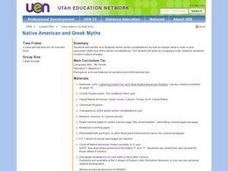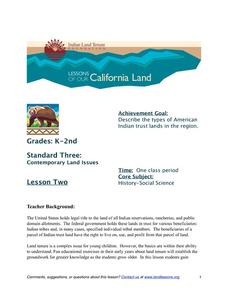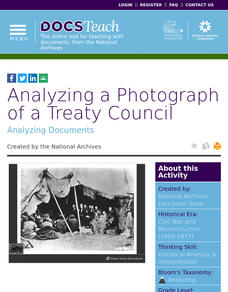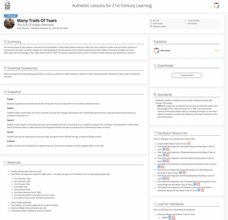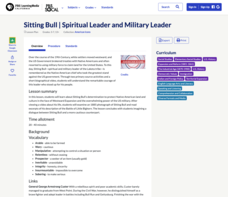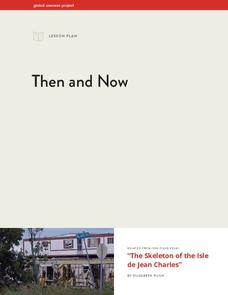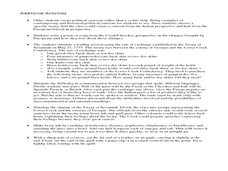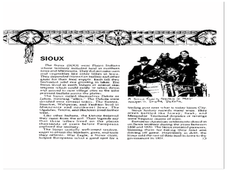Curated OER
Encounters – Native Americans and Euro Americans (1850-1870)
Students consider the plight of Native Americans. In this Oregon history lesson plan, students research Internet and print sources regarding land conflicts between the whites and Native Americans. Students discuss resettlement and...
Curated OER
Philanthropic Beliefs of Native Americans
Students examine the tradition of giving and sharing in early Native American communities. In this philanthropy lesson plan, students define the term philanthropy, list 3 traditions of Native American giving and sharing, and identify 3...
Curated OER
Native American and Greek Myths
Fifth graders identify seven different constellations and explain a myth that accompanies it. As a class, they listen to myths associated with the Greek and Native American cultures. To end the lesson, they write their own myth related...
Curated OER
Learning About the Kumeyaay Indians
Third graders research the Native American nation of Kumeyaay. Scholars use the internet to research past history. Through email, 3rd graders communicate with a Kumeyaay child to discover life on a present day reservation. They create a...
Curated OER
Third Grade Social Studies- Quiz
In this social studies worksheet, students complete a 25 question multiple choice quiz about early American colonial life and the Cherokee and other Native American tribes.
Indian Land Tenure Foundation
Indian Trust Lands
An important aspect of studying Native American history is understanding the nature of trust lands. Budding historians will learn that as Native Americans were removed from their home lands, trust lands were provided in the form of...
Alabama Department of Archives and History
Conflict in Alabama in the 1830s: Native Americans, Settlers, and Government
To better understand the Indian Removal Act of 1830, class members examine primary source documents including letters written by Alabama governors and the Cherokee chiefs. The lesson is part of a unit on the expansion of the United...
DocsTeach
Analyzing a Photograph of a Treaty Council
A photo catches a moment in time that provides a glimpse into the past. An interesting resource focuses on historical analysis using an image from a treaty council with Native Americans. Budding historians complete an online worksheet...
K20 LEARN
Many Trails of Tears: The Era of Indian Removal
Cherokee, Chickasaw, Choctaw, Creek, and Seminole. All were forced off their ancestral lands in the southeastern United States as part of the Indian Removal Act of 1830. Young historians research the tribes' reactions to this removal and...
Curated OER
Jacksonian America and the Indian Removal Act of 1830
Students utilize primary sources to explore the national climate concerning Native American Indians during the Andrew Jackson administration. They are presented with opinions for and against the Indian Removial Act of 1830 as they...
PBS
Sitting Bull: Spiritual Leader and Military Leader
Sitting Bull was not expected to be a great warrior. Yet, he led the Lakota people and other tribes to several pivotal victories against the United States government when federal troops threatened their land. Using primary sources, such...
K20 LEARN
Whose Manifest Destiny? Westward Expansion
Your land is my land! Young historians investigate the concept of Manifest Destiny used by the United States government to justify western expansion. Jigsaw groups read primary source documents to gain an understanding of the movement...
New York City Department of Education
Colonial America and The American Revolution
How did the founding of the American colonies lead to a revolution? Use the essential question and sample activities to guide learners through a series of history lessons. Additionally, the packet includes effective strategies to...
iCivics
Tribal Government: High School
Did you know there are 567 federally recognized American Indian and Native Alaskan tribes and villages in the United States alone? The resource helps break down the complexities of many different tribal societies to explain the concept...
Curated OER
Governance- Grade 9
Ninth graders participate in talking circles about how their classroom will function. In this self-governance lesson, 9th graders participate in talking circle activities to create rules that will govern their class. Students compare...
Global Oneness Project
Then and Now
The devastating changes happening to the Native American inhabitants of an island off the coast of Louisiana are the topic of an informational instructional activity. After scholars break into groups to explore particular topics, they...
Curated OER
The Constitution & Native Americans
Pupils identify and consider US Constitutional origins in American Indian culture. They discuss and consider what it means to them to attribute the origins of the US Constitution to American Indian oral tradition. They compare the...
Curated OER
Native Lands: Indians in Georgia-Shifting Ground Political Cartoon-Introduction
Students explore the relationship between the Creek, Cherokee, and European/American cultures prior to the American Revolution. Students do Internet research to identify and explain changes in these cultures, then ...
Curated OER
American Indian Civil Rights
Students examine social justice issues regarding American Indians. In this civil rights lesson, students investigate the Red Power Movement of the 1960's and 1970's. Students then roleplay interviewing Native American protesters.
Curated OER
People for the Land: Native Americans in Iowa
Students identify Iowa's American Indian cultures and complete a research project for the topic. In this Iowa's American Indian lesson, students research read the background information about tribes in Iowa and complete a research...
New York State Education Department
US History and Government Examination: January 2018
It's time to test those skills! Assess pupils' knowledge of US history and government with short answer questions, multiple-choice items, and essays. The resource serves as a standardized test that functions well for a final exam....
New York State Education Department
US History and Government Examination: June 2018
Ready to test your learners about anything and everything related to United States history and government? The resource uses multiple-choice and essay questions to assess knowledge.
Center for Civic Education
What Basic Ideas About Government Are Included in the Preamble to the Constitution?
Young historians explore the meaning of the Preamble to the US Constitution in this upper-elementary social studies lesson. Working with partners or in small groups, children discuss the purpose of government before reading and analyzing...
Curated OER
Analyzing Primary and Secondary Sources to Assess the Decisions and Policies of Sitting Bull, Red Cloud, and the U.S. Government
Students examine U.S. policies regarding Native Americans. In this Native American history lesson, students analyze provided primary and secondary sources concerning Red Cloud, Sitting Bull, and the Dawes Act. Students use the provided...




